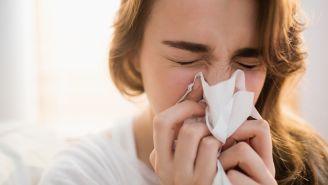Updated on June 21, 2024.
If you have seasonal allergies, you've probably become used to sniffles, sneezing, and incessant sinus pressure. But even though they are familiar, these symptoms can deprive you of sleep and make you feel miserable.
The good news is that you have the power to start taming your sinus symptoms right now.
Here are three simple self-care strategies that are easy, inexpensive, and ideal for softening your symptoms.
3 simple sinus-soothers
If you have chronic sinus problems, you'll definitely want to make an appointment with a healthcare provider (HCP) to get them checked out. You may need medication or other treatments to find consistent relief.
But in the meantime, while you wait for that appointment, you can try some self-care approaches. Note that these tips will only mask the issue, rather than unearth their root cause. Be sure to stick with any prescription medication program you're currently following until your HCP directs otherwise. The following sinus soothers may be great add-ons to the treatment approach you're currently following
Master your environment
While you can't control the world, hopefully you can control the space you occupy so that it's kinder to inflamed sinuses. Try:
- Making it warm and moist: That way your sinuses stay moist, which can help with drainage. Humidifiers, vaporizers, or a warm shower should do the trick.
- Cleaning it up: That means kicking your allergen-avoidance efforts into high gear, if you have allergies.
Put an end to pain
A stuffy, runny nose is bad enough. Add pain to the mix and you'll feel downright wretched. So kick pain to the curb right away. Try:
- Applying ice and/or heat packs: These can help relieve pain and pressure due to congestion and inflammation.
- Gargling with a bit of salt water: This can offer relief of a sore throat brought on by postnasal drip.
- Taking over-the-counter (OTC) painkillers: These may help ease sinus pain.
Baby your nose
Whether you're fighting off allergies, a sinus infection, or a cold, you've got lots of options for dealing with symptoms right away, from OTC meds to basic saline nasal sprays. Try:
- Going over the counter: Look for decongestants, antihistamines, and supplements that may help speed symptom control.
- Limiting irritants: That means avoiding chlorinated pools, temperature changes, and secondhand smoke, to reduce nasal irritation.
- Getting wet: With a saline nasal spray or a neti pot, which can provide quick nasal clearing. Just be sure to follow package instructions carefully.
- Drinking plenty of water: This helps you stay hydrated, which can help ease discomfort and thin your nasal secretions.
You call the shots
Of course, taking care of your health can help bolster your immune system. So eat a healthful diet, exercise, reduce stress, and get plenty of sleep—and lay off the alcohol and cigarettes. These can improve your overall well-being and help you breathe easier.






